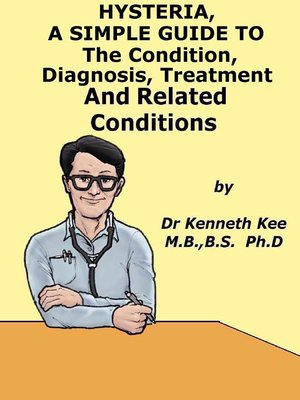Hysteria, a Simple Guide to the Condition, Diagnosis, Treatment and Related Conditions
ebook
By Kenneth Kee

Sign up to save your library
With an OverDrive account, you can save your favorite libraries for at-a-glance information about availability. Find out more about OverDrive accounts.
Find this title in Libby, the library reading app by OverDrive.



Search for a digital library with this title
Title found at these libraries:
| Loading... |
Hysteria
"I suppose I have found it easier to identify with the characters who verge upon hysteria, who were frightened of life, who were desperate to reach out to another person.
But these seemingly fragile people are the strong people really."
― Tennessee Williams
What is Hysteria?
Hysteria or Conversion disorder is a group of mental disorder characterized by physical symptoms such as paralysis or other nervous system symptoms suggesting medical disorder but where no organic finding is found or known physiological mechanism.
Hysteria or Conversion disorder is a mental condition in which a person has symptoms that cannot be explained by positive medical evaluation.
There is evidence of symptoms linked with psychological factors or conflicts.
Initially some doctors believed that these patient were malingering but towards the end of the 19th century Sigmund Freud believed that the condition is a true psychiatric disease.
It was then known as Hysteria.
The term conversion was used by Freud to indicate that the patient's symptoms of anxiety has been converted to physical manifestations.
Although most doctors believed that hysteria is seldom seen in the present time, it would appear that there are still many cases of hysteria or conversion disorders even now.
There are particularly high rates of childhood sexual abuse found in the histories of patients who have diagnosed as having conversion disorder.
What are the causes of Hysteria?
Causes:
Hysteria or Conversion disorder patients have symptoms which may result from a psychological conflict.
Symptoms usually happen suddenly after some stressful experience such as a death of a loved one.
The risk of hysteria or conversion disorder may occur if they also have:
a. A medical illness,
b. A dissociative disorder where there is escape from reality
c. A personality disorder where there is inability to manage feelings and behaviors that are expected in certain social situations.
Persons who have hysteria or conversion disorder are not making up their symptoms (malingering).
Some doctors do not believe that this disorder is not a real condition and may tell patients the problem is all in their mind.
But this disorder is a real condition.
It causes a lot of emotional distress in the patient and cannot be switched on and off at will.
The physical findings are thought to be a way by the patient to resolve the emotional conflict that the patient feels inside his body or mind.
A woman who do not believe in being violent may instead feel numbness in her arms after feeling so much anger that she wished to hit somebody who is the source of her anger.
She expresses her anger in the symptom of numbness in her arms instead of allowing herself to think of hitting someone.
What are the symptoms of Hysteria?
Symptoms:
The symptoms of Hysteria or conversion disorder is usually dramatic, vague or exaggerated
The patient may give a complicated history with many diagnoses.
Symptoms of a conversion disorder include the loss of one or more bodily functions, such as:
1. Pseudoneurogical symptoms such as paralysis or blindness
2. Inability to speak
3. Numbness of hands or feet
4. Gastrointestinal - abdominal pain
5. Reproductive - painful menses
6. Psychosocial – impotence, sexual indifference
7. Pain such as back pain or headache
8. Giddiness or dizziness
9. Palpitations
How is the diagnosis of Hysteria made?
Diagnosis:
Diagnostic investigations do not find any physical source for the...






